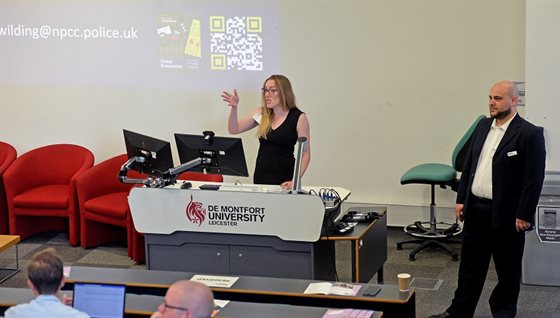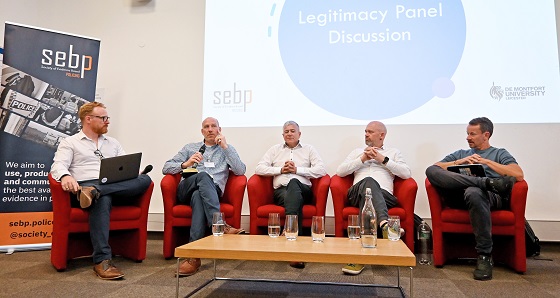Senior police officials, academics and practitioners have come together to explore how collaboration between forces and universities can drive greater innovation and tackle challenges facing modern policing in the UK.
More than 120 delegates from 20 police forces & institutions and 13 universities attended the Society of Evidence-based Policing (SEBP) Midlands Regional Conference, which this year was hosted by De Montfort University (DMU) Leicester’s Policy Unit and Business and Law (BAL) faculty.

Ch Supt Kate Anderson (left) and Dr Ahmad Al-Hiari from DMU's Policy Unit (right) at the conference
Professor Katie Normington, Vice-Chancellor of DMU, who opened the conference, emphasised its importance to the university’s strategic vision for creating meaningful partnerships between academic and public sector organisations.
Professor Normington said: “This conference demonstrated the real impact that comes from strong, sustained collaboration between universities and police forces.
“It showed how research, dialogue and trust can generate practical insights that improve services and strengthen communities. At DMU, we are committed to partnerships that support innovation and deliver meaningful change.”
The conference outlined how generative AI is becoming more prevalent in fraud and sexual abuse cases, with T/Superintendent Lewis Lincoln-Gordon explaining the need for academia and public services to combat the threat.
Superintendent James Sutherland discussed the gamification of policing, stating how the concept of enhancing systems and services through integrating elements such as leader boards or special rewards like in video games could be applied to areas of police work, while Professor Edward Cartwright, Associate Dean Research and Innovation within BAL, lead a session on ransomware negotiation – which has been a growing issue for private and public organisations across the world in recent years.
Professor Dave Walsh from Leicester De Montfort Law School, shared his work on investigative interviewing and the international ImpleMéndez project, which aims to implement the UN-endorsed 'Mendez Principles' for ethical interviewing, moving law enforcement agencies worldwide away from coercive interrogation methods toward human rights-compliant approaches.
Monty Mountford OBE, PhD student at DMU, delivered a session informed by Monty's 35 years of military experience. He showcased his research at DMU on the potential of the concept of sense-making, a process where officers interpret uncertainty through data gathering and critical reflection to determine the appropriate course of action, as a source of novelty in tackling serious and organised crime.
There was also a panel discussion exploring ways in which the police can rebuild public trust and confidence following a decline in recent years after high-profile incidents of misconduct and crime.
Dr Matt Bland, Chief Operating Officer of the SEBP, joined Dr Paul Quinton of the College of Policing, Mark Evans OBE from SEBP Australia and New Zealand, Professor Ben Bradford from University College London and Professor Jonathan Jackson from the London School of Economics and Met Police Legitimacy Board.

Legitimacy Panel from left to right: Dr Matt Bland (SEBP), Dr Paul Quinton (College of Policing), R. Mark Evans OBE (SEBP, Australia & New Zealand), Professor Ben Bradford (UCL), and Professor Jonathan Jackson (LSE & Met Police Legitimacy Board)
Dr Bland said: "The Midlands SEBP Conference was a fantastic example of what happens when practitioners, researchers, and policy professionals come together with a shared commitment to evidence and impact.
“In partnership with De Montfort University, we were proud to showcase real-world innovation and rigorous thinking—driven not by theory alone, but by a desire to solve the challenges policing faces today. Events like this are vital for building momentum behind evidence-based practice across the country."
DMU, and its Policy Unit, has taken a leading role in reimagining the relationship between police forces and academia.
In April, former Chief Constable of Leicestershire Police, Rob Nixon, joined DMU as an honorary professor to mentor students and advise on the curriculum as part of the university’s mission to bridge the gap between research and policing practice.
DMU’s Policy Unity, in collaboration with the East Midlands Police-Academic Collaboration (EMPAC), hosted an event with police officers and academics to explore how responsive models for knowledge exchange can be developed.
Dr Ahmad Al-Hiari, Lecturer in Leadership at DMU and Founder of the DMU Policy Unit, explained the need for deeper partnerships that further support the police in accessing academic innovation in a more rapid and contextualised manner.
Dr Al-Hiari said: “We’re proposing a new way for police and researchers to work together. Instead of occasional cooperation, we aim to build a framework that facilitates continuous collaboration.
“Our mission is to create a responsive mechanism that helps police forces become more effective by supporting them with the right mix of data, innovation and reflexivity.”
DMU's Policy Unit is an academic network that uses the university’s research expertise to address policy challenges the country faces.
Posted on Tuesday 15 July 2025